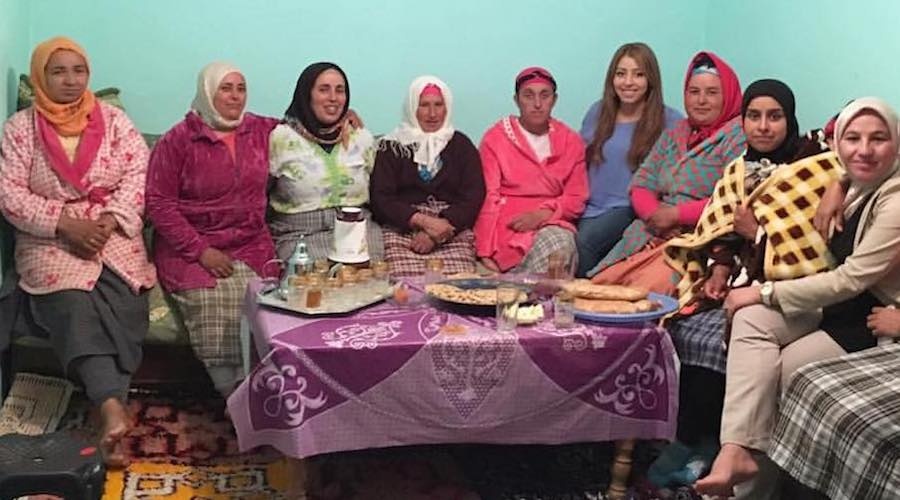Lamia Bazir is rethinking social entrepreneurship in Morocco

Lamia Bazir could have made a career outside Morocco, advocating for women’s empowerment and gender equality all over the world.
She had it all: a stellar education background with degrees from Columbia University and Sciences Po Paris, a resume that included work with Transparency International and a United Nations Volunteering Award in 2015.
But in 2012 she was looking inwards to her birth country, and chose instead to launch a social venture called Empowering Women in The Atlas, which is working with 100 women to break the social barriers that led those women to not be seen as entrepreneurs.
“I had the idea in mind that it cannot be all about empowering the women in rural areas, you have to think about impact, the economic value,” she told Wamda.
“The issue was that women could not be financially independent because of the lack of economical opportunities, transportation and even basics like water sometimes, and this was drawing a gloomy future for them.”

Making friends
The first time Bazir met women from the Atlas mountains was for a practical exercise about women handicraft for an Al Akhawayn University course.
“I was not taken aback by [the women’s] poverty because I had already seen a lot of poverty in Morocco, but more by their determination to do something about it,” she said.
Bazir remained in contact with the women long after the exercise finished, nurturing friendships and collectively trying to find ways for the women to earn a decent living.
“I was never the girl from a privileged background who came to save them, we were really on equal grounds, thinking about what could we do that did not already exist.”
But where social entrepreneurship anti-poverty aid often comes in the form of funding or loans, Bazir wanted to develop “human potential” first. She wanted her friends to have an influence on their own ecosystem.
“We listened to their needs and we try to see what we do to help but also to make any initiative sustainable,” she said. “My goal is to create systemic changes, I am here to do fundraising, to accompany the women but then, I will be off to another initiative, the aim is to make them completely autonomous.”
A broad background
Bazir’s upbringing and social roots eased her contact with the women.
She grew up in a port town and had a wealthy upbringing, but she was always playing in the streets with children from different social backgrounds, and her family came from a different background.
“I grew up with the value that everyone should have the same chances and opportunities in life no matter where they came from,” she said.
During her studies and now her work with the government, she always made a point of switching gears between the worlds, swapping the fancy world of ministries and diplomatic debates with time in the Atlas mountains.
“Most of those women are great farmers but they don’t have any contact with their market so they can’t really have a feedback and foresee a growing plan for their business.”

An issue of innovation
The agricultural workforce in Morocco is mainly composed of women - about 57 percent of women are engaged in agricultural activities in Morocco according to FAO - and the need to innovate is clear.
Hassan Faouzi a geographer and sociologist, said Bazir’s initiative provided a much needed new vision for social entrepreneurship.
“When you walk around the Moroccan cities, a first observation is obvious: the predominance of men in the products and services of all kinds while women are less visible, and companies owned by women, in many cases, only cover the most urgent expenses of the household,” Faouzi said.
“The lifting of the barriers on women's entrepreneurship often gives rise to lengthy debates on the action to be taken and Bazir enables them to take a step further.”

Small steps to break the isolation of women
Instead of launching an international career on the back of her international experience, Bazir has used it as a launchpad for her Moroccan initiatives.
“I learnt that you don’t have to just accept things as they are and that you can question everything and try to make a change,” she said.
While still a student at Columbia University she was designated as a UN youth representative to the Economic and Social Council of the United Nations in 2013, where she worked for more than a year on sustainable development in poor countries.
This program in particular gave her a solid ‘green’ background that she tried to implement in her initiative with the women in the Atlas mountains: the quest for a sustainable business model for women entrepreneurs in Morocco had to go hand in hand with awareness of climate change.
“We managed to raise funds with original projects such as a green friendly hammam or other projects related to solar energy,” Bazir said, adding that MEPI, an american fund, was financing the empowerment program with $100,000.
Bazir is now still thinking about how to make her initiative grow but also how to become a professional social business initiator and to shape her own job to help more of the women.
Feature Image via Lamia Bazir


